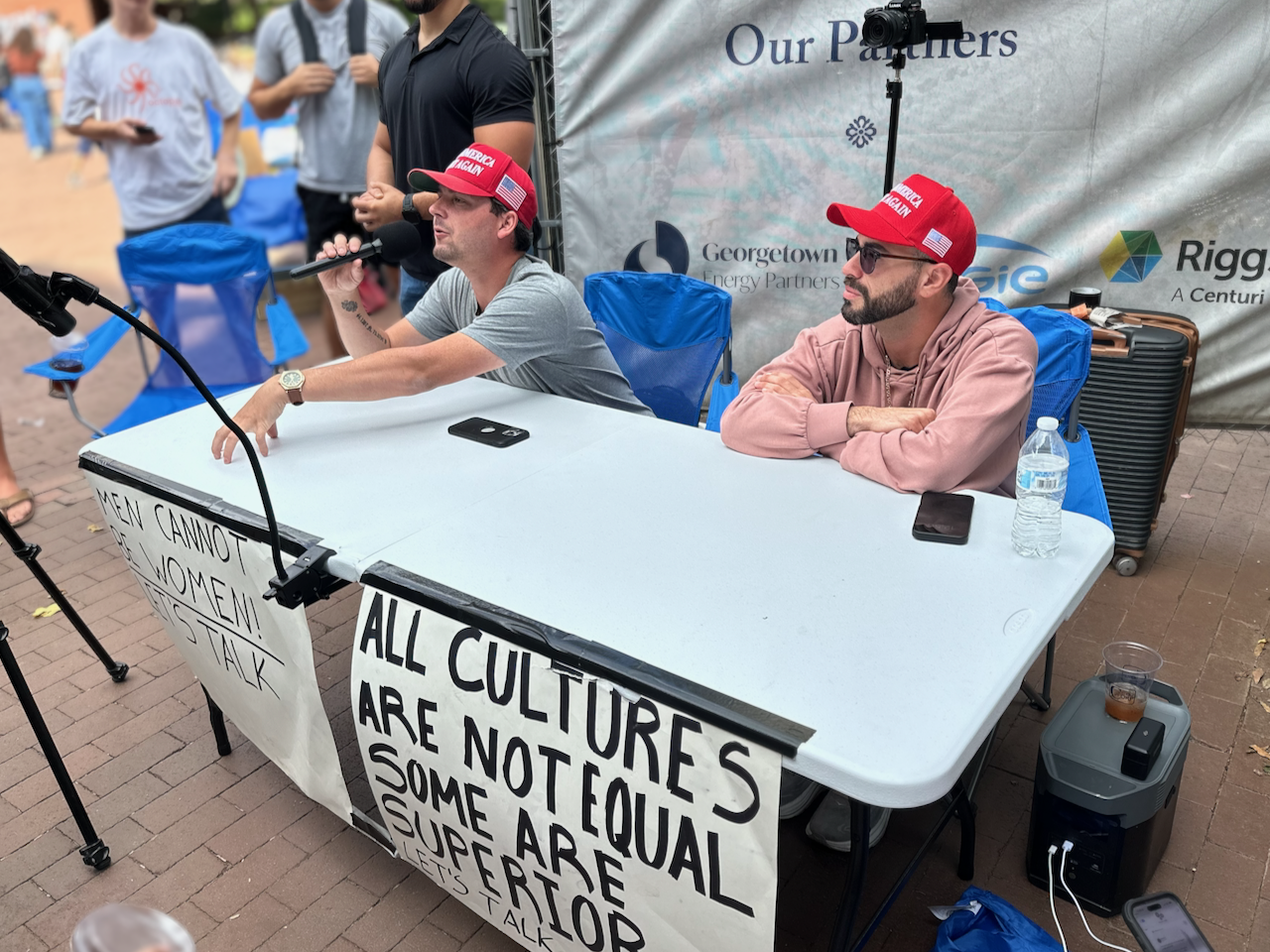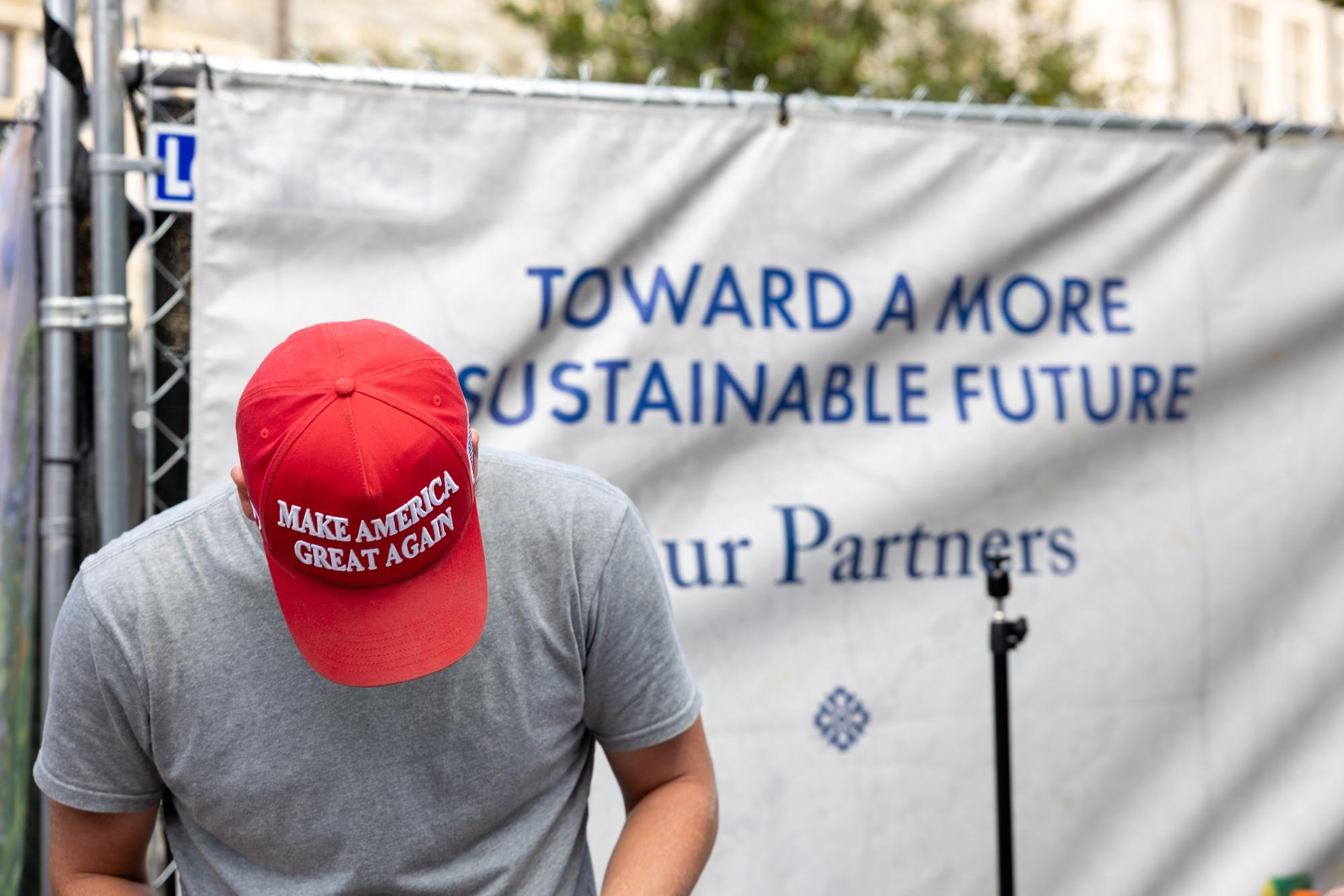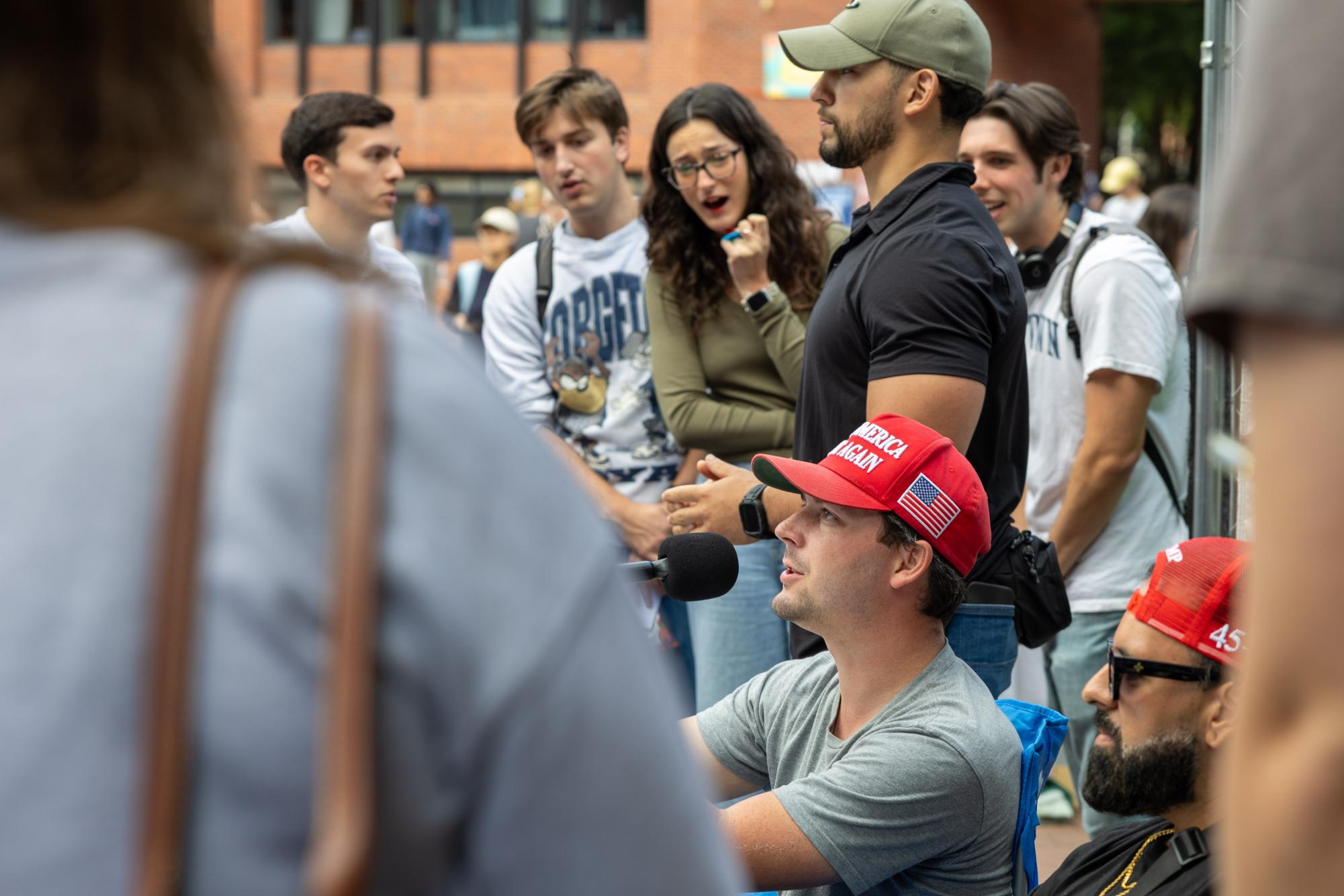Four conservative microinfluencers tabled on Georgetown University’s campus without university authorization Oct. 2 to invite debate from students on provocative political issues.
The influencers, including Cameron Higby, David Khait, Lance Johnston and Fabian Garcia, visited Georgetown as part of their “Fearless Tour,” for which they have already visited the University of Maryland, Clemson University and the University of Tennessee. Their table at Georgetown, which garnered a crowd of about 50 people and remained in Red Square for about two hours, showcased posters reading “Men cannot be women! Let’s talk” and “All cultures are not equal some are superior let’s talk.”

The tabling comes less than a month after conservative activist Charlie Kirk’s Sept. 10 assasination, which has sparked debate over political violence and free speech on college campuses.
Johnston, a 23-year-old from Texas who debated students at the Fearless Tour table, said the organization’s trips to universities were in part spurred by Kirk’s assassination.
“We started this tour the Monday after Charlie had died, so that we could show our side that we’re fearless in the face of leftist violence,” Johnston told The Hoya. “I think it’s really important to have these conversations, especially on college campuses where ideas are challenged and people can have discourse. We want to do it very, very peacefully.”
The debates with Georgetown students spanned various issues, including the topics of their posters, the national economy, healthcare and women’s rights.
Max Dunn (CAS ’29), who debated two of the activists, said he believes in discourse across political divides but he does not feel the debate table was helpful.
“I think that it’s good to engage with these ideas and it’s good to talk to these people, but you do have to realize that once they’re coming to film people, they’re not going to be very fair in the editing,” Dunn told The Hoya. “They’re not going to be very judicious in what clips they put out. I think that they are trying to get the worst elements of our campus, and they’re trying to really inflame tensions.”
Fearless Debates’ Instagram page, which has 317,000 followers, includes short clips of Johnson and the other influencers debating college students on political issues.
The Capitol region chapter of Turning Point USA (TPUSA), the conservative advocacy group Kirk led, coordinated the Red Square tabling, according to the four tablers and multiple Georgetown students involved with TPUSA. The four tablers, all of whom were wearing “Make America Great Again” hats, were not affiliated with TPUSA.
Sarah Mahinay, the college field representative for TPUSA Capitol who was present during the tabling, did not respond to repeated requests for comment.
Shae McInnis (CAS ’28), vice president of Georgetown’s newly formed TPUSA chapter, said the campus visit was designed to foster dialogue across opposing political views.
“This is just a great way to get free speech back on this campus,” McInnis told The Hoya. “Whether you agree or not, it’s good that everyone can have their views expressed. It’s great to see a lot of my liberal friends in this crowd having good conversations about some of these pressing issues. We need to solve our problems with more dialogue, more conversations, and never turn to violence or threats or intimidation.”
Garcia said the activists aimed to better understand liberal students to learn how to change their minds.
“We like to have civil discussions and debates,” Garcia told The Hoya. “We don’t badger people. We really want to open a discussion because you can’t understand how to help someone if you don’t understand what they really think — not the stuff we see online, where all we see is of the extremists doing really bad things. These are the people that we want to talk to, because this is the next generation of students that are going to become voters and decide the future of the country.”
The Fearless Debate Instagram page includes criticism of some activists they have encountered, including a post calling the left “disgusting.” Garcia has also posted separate claims about an “Islamic takeover” of the United States, listing elected officials who are Muslim.

Most of the debates with Georgetown students were civil, though some spectators criticized the tablers for being one-sided in their responses.
Cash Moore (CAS ’28), another liberal Georgetown student who debated, said he was glad for the opportunity to debate the four conservative tablers.
“I think it’s important to confront conservatives on their ideas,” Moore told The Hoya. “I do think honestly, there’s a hesitancy on the left to debate people, and that’s something we should dispel, because I think our arguments are strong enough to be defended. And I love it — it’s fun. I try to do this whenever I can, whenever I see conservatives.”
Erika Cohen-Derr, university associate vice president for student affairs, was present during the tabling. The Hoya observed Cohen-Derr speaking with some of the activists and representatives from the Leadership Institute, a conservative nonprofit whose members worked alongside the four tablers, saying the group did not have official authorization to be on campus.
The university’s implementation guidelines for its Policy on Speech and Expression designate Red Square as a “public square,” though the university reserves the right to regulate based on time, place and manner. According to the guidelines, public square areas are open to “university community members” for “expressive activity.”
The Hoya did not observe any action to remove the individuals or their two hired security guards. Three officers from the Georgetown University Police Department (GUPD) were present throughout the tabling. Cohen-Derr and the members of the Leadership Institute declined requests for comment.
Dunn said he was glad the activists were not removed from campus even though he disliked their presence.
“I think that what they’re doing is pretty objectionable, but we do have a free speech policy that I think we need to continue to uphold,” Dunn said. “So I’m not happy they’re here, but I would be even less happy if they got kicked out.”
Miya Yoshida (SFS ’28) — the tabling and development director of H*yas for Choice (HFC), an independent student organization advocating for reproductive rights — said tabling near the Fearless Tour table posed difficulties for HFC members.
“It’s very difficult, because when it’s a table sitting next to you, that’s one thing — and that’s something our tablers are aware of, that there are different organizations on this campus — but when it’s not a campus-affiliated thing, and it’s a very provocative situation, that can be difficult for us to move on with our operations, making sure we don’t get overwhelmed by a sea of oppressive ideologies that we can be surrounded with at Red Square,” Yoshida told The Hoya.
In response to a question from a student journalist at The Hoya with Indian heritage, Johnston said he does not respect Indian culture but he is not racist.
“The culture is inferior in India,” Johnston said. “They kill women for insufficient dowries in India, a lot of women in fact, and I would say that’s an insufficient culture. It’s not a good culture. And I think the West is better — not you specifically because of your race or skin color, but that culture specifically is morally wrong.”
Overgeneralizing and misrepresenting cultures by taking one aspect as representative is generally seen as stereotypical and racist, according to many scholars, experts and activists. A United Nations Educational, Scientific and Cultural Organization (UNESCO) 1978 declaration said that racist ideologies and discrimination are inconsistent with an international order that values human rights.
Johnston added that it does not matter to him if Georgetown students present alternative views about their culture.
“The facts don’t really care,” Johnston said. “I mean, if you’ve had experiences — you can have different experiences in different countries, but it does happen, and we need to call it out.”

Zadie Weaver (CAS ’28) — vice speaker of the student government, Georgetown University Student Association (GUSA), senate — said that while she values political debate, watching the discussions at the table did not feel like genuine discourse.
“There’s real things that are going on in this country that are actually affecting people, that are affecting policy, the government is shut down, a lot of consequential stuff, and now these people are coming to college campuses to argue about things that really don’t matter, are not pressing, because they know that they can’t win fights about things that actually matter,” Weaver told The Hoya.
Moore said he wants to continue debating conservative activists, even if he does not agree with their views.
“We’re the political school,” Moore said. “We should be able to have conversations and confront people that disagree with us. So for sure, I think it’s a good thing, even if I think they’re evil, terrible, fascist and rapist supporters.”
Weaver said focusing on what she characterized as extremist issues was not actually helpful to fostering dialogue.
“I like debate. I like political discourse,” Weaver added. “I think it’s good to listen to the other side. I think it’s good to break echo chambers. I think this is actually antithetical to any sort of productive discourse.”